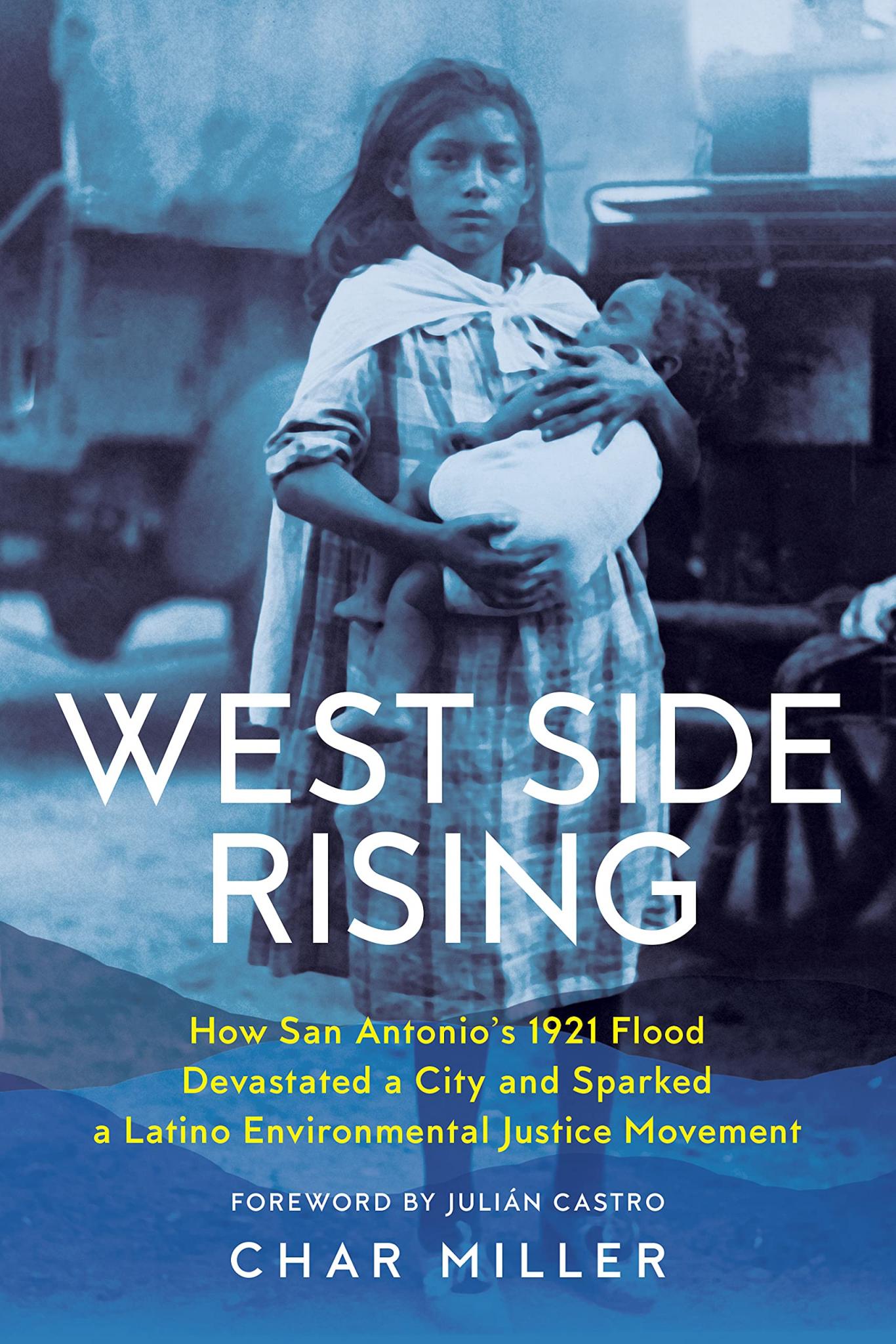
Non-Fiction
Char Miller, Forward by Julián Castro
Hardcover, ISBN 13: 978-1595349385, 256 pages
September 7, 2021
A century ago, a tropical weather system stalled over South Central Texas, unleashing massive flooding. San Antonio bore much of its brunt, and hundreds are believed to have died there.
Char Miller’s West Side Rising is a well-researched, well-written study detailing how the 1921 storm devastated San Antonio’s central business district and destroyed entire neighborhoods where low-income Mexican and Mexican American residents lived. For many decades, their dwellings had been confined, both by economics and local political racism, to undesirable areas near large creeks in the city’s West Side floodplain.
“Few in this community felt they had the power to alter what appeared to be natural; few believed they could make themselves heard in city hall,” writes Miller, a longtime Trinity University professor who now teaches environmental analysis at Pomona College. “Their sense of powerlessness was a logical and deliberate outcome of a community under the control of a closed, Anglo-dominated power elite.”
However, the 1921 deluge and later water disasters also brought momentum to Latino activist groups such as Cruz Azul Mexicana and Communities Organized for Public Service, the author notes. These organizations sought better protections and resources for vulnerable neighborhoods that had been built, washed away, and rebuilt several times along flood-prone creeks. Still, the city’s huge Olmos Dam, completed north of downtown in 1926, “absorbed the lion’s share of the bond money dedicated to flood prevention” and mostly protected downtown San Antonio.
Miller writes that the 1961 election of Henry B. González to the U.S. House of Representatives proved fortuitous for San Antonio’s beleaguered West Side. González had grown up there and was able to steer significant federal funds to his damaged district after a 1974 flood. “With money came power; with power came the authority to determine where the money should be spent.”
In this noteworthy book, Miller has drawn from “a constellation of primary and secondary sources, including correspondence, government documents, and photographs, oral histories, and newspaper accounts, as well as scholarly analyses of this and other floods. . .” Many of the documents, he adds, “have been overlooked and are, as a result, all the more riveting.”
There was, he emphasizes, “longstanding disregard” in local government and the San Antonio business community for the plight of the West Side’s poor neighborhoods. Municipal flood plans repeatedly were more “concerned with ongoing projects to hasten the movement of water down the San Antonio River and through the central core as soon as possible.” Recommendations from flood safety experts were ignored.
But since the mid-1970s, Hispanic community organizers, new political coalitions, new city leaders, and better-informed voters have helped reshape San Antonio’s politics and environmental concerns. And well-focused projects over the past two decades have significantly reduced the flooding risks from the West Side’s creeks.
In a time of growing concerns over climate change, West Side Rising could spur some compelling questions for agencies and individuals trying to help their cities, states, or nations prepare for future disasters and the economic and social turmoil that might follow. If clear policies, adequate funds, and careful safeguards are not put in place and closely monitored, those who need help the most after a disaster may be the ones who receive it last.
Char Miller, formerly a professor of history at Trinity University, is the W. M. Keck Professor of Environmental Analysis at Pomona College. He is the author of the award-winning Gifford Pinchot and the Making of Modern Environmentalism, Deep in the Heart of San Antonio: Land and Life in South Texas, and Public Lands/Public Debates: A Century of Controversy, as well as the editor of On the Border: An Environmental History of San Antonio and Fifty Years of the Texas Observer. His most recent books for Trinity University Press are Not So Golden State: Sustainability vs. the California Dream and On the Edge: Water, Immigration, and Politics in the Southwest. Miller is a frequent contributor to print, electronic, and social media.
Julián Castro, a lawyer and politician from San Antonio, Texas, launched his public service career in 2001, becoming the youngest councilman in the city's history. He served as mayor from 2009 to 2014, and as US secretary of housing and urban development from 2014 to 2017. He is the author of An Unlikely Journey: Waking Up from My American Dream.
